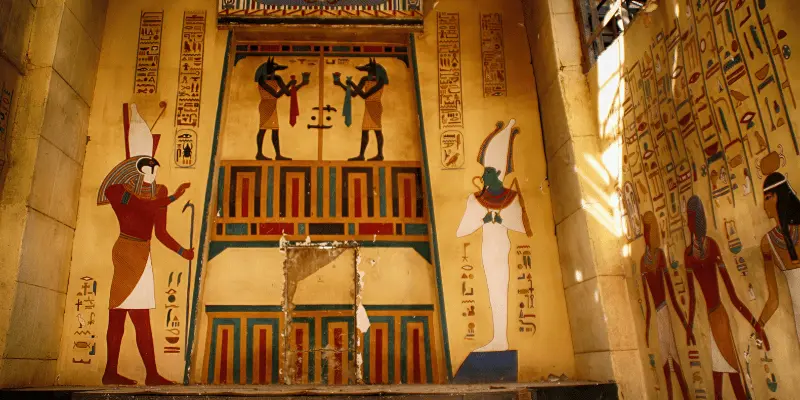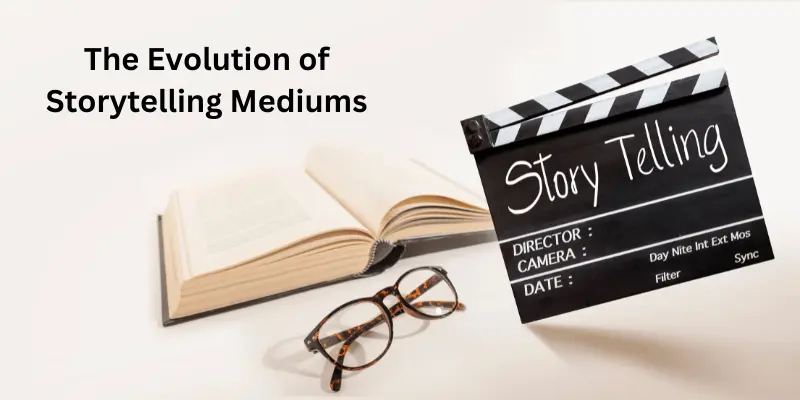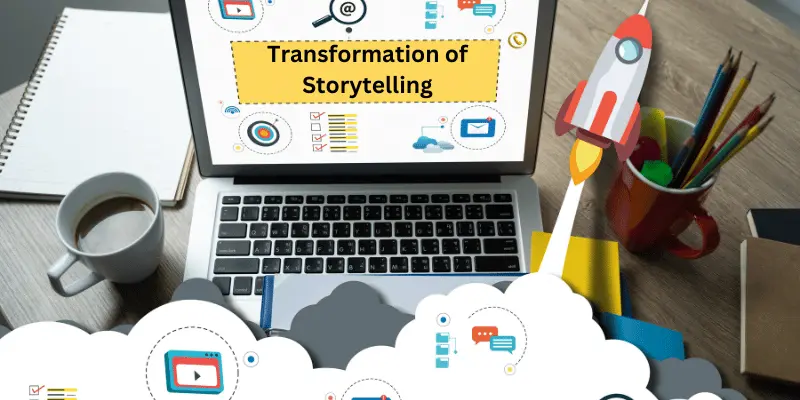The History of Storytelling – From Ancient Fires to Modern Screens
Updated: 22 Nov, 2024
1741
Let’s dive into the history of storytelling, where you will find the roots of storytelling. Do you know friends’ storytelling is an art as old as humanity itself.
It’s how our ancestors shared knowledge, entertained one another, and connected as a community.
You will come to know from the origins of storytelling around prehistoric campfires to the transformation of storytelling forms in the digital age.
This beautiful journey through time reveals how stories have shaped—and been shaped by—human history.
Let’s dive into this fascinating world and explore how storytelling has evolved through the ages.
How Did Storytelling Begin?
Imagine yourself sitting around a crackling fire, shadows dancing on the cave walls, as someone recounts a thrilling hunt or explains the mysterious stars above. Just wow.
That’s where the history of oral storytelling truly began. These early stories were not just entertainment, they were survival tools.
These stories teaching lessons about the natural world, passing on cultural beliefs, and preserving traditions.
Before humans could write, they relied on ancient storytelling techniques, like using gestures, expressions, and even drawings on cave walls.
These origins of storytelling laid the foundation for what would later become written narratives.
Related Articles
Storytelling in Ancient Civilizations

As societies developed, so did their stories also developed with them.
The storytelling in ancient civilizations like Mesopotamia, Egypt, and Greece gave rise to myths, legends, and epics.
These stories explained everything from the creation of the world to the quirks of human behaviour.
Here is a short look Storytelling in Ancient Civilization
- The Sumerians and Cuneiform: The Epic of Gilgamesh is one of the earliest recorded stories, preserved on clay tablets using cuneiform script.
- Egyptian Hieroglyphs: These visual narratives immortalized tales of gods, pharaohs, and afterlife beliefs on temple walls and scrolls.
- Greek Epics: Homer’s Iliad and Odyssey are perfect examples of how stories served both as entertainment and as moral guides.
Each civilization added its flavour to traditional storytelling methods, shaping how narratives were shared and remembered.
The Role of Storytelling in History
What’s remarkable about storytelling is its ability to reflect and influence the times.
In the Middle Ages, for instance, folklore and ballads—key components of folklore and storytelling—served as both entertainment and a way to share lessons.
Stories like Robin Hood or King Arthur were passed down orally, often changing with each retelling.
In many cultures, storytelling wasn’t just about amusement.
It was about preserving identity. Indigenous peoples, for example, used traditional storytelling methods to pass down history, values, and beliefs.
The role of storytelling in history has always been about connection—linking the past to the present and paving the way for the future.
The Evolution of Storytelling Mediums

Fast forward to the invention of the printing press in the 15th century. Suddenly, stories that were once confined to oral traditions or handwritten manuscripts could be mass-produced.
This revolution marked a major milestone in the development of storytelling mediums.
Books became accessible to more people, and authors like William Shakespeare and Geoffrey Chaucer crafted timeless tales.
In the 20th century, cinema took storytelling to a whole new level. Movies combined visuals, dialogue, and music to create immersive narratives.
And today? Technology continues to redefine the craft with podcasts, video games, and even virtual reality.
Storytelling Across Cultures
Every culture has its own way of telling stories. Storytelling in different cultures reflects the values, fears, and aspirations of its people.
For example:
- Asian Cultures: Ancient Indian epics like the Mahabharata and Ramayana intertwine philosophy with heroism. Meanwhile, Japanese Kabuki theatre presents dramatic tales with elaborate costumes and music.
- African Traditions: Griots, or oral historians, in West Africa, play a crucial role in preserving the history of narrative traditions.
- Native American Stories: These often blend spirituality and nature, teaching lessons about respect for the earth and community.
Despite their differences, all cultures use stories to connect, teach, and inspire.
Impact of Storytelling on Society
Storytelling has always been more than just entertainment. It’s a mirror reflecting our values, struggles, and dreams.
Through the ages, it has shaped societies by fostering empathy, transmitting knowledge, and inspiring action.
Think of how religious texts, political speeches, or even fairy tales have influenced behaviour and beliefs.
The impact of storytelling on society is evident even today. Modern narratives, whether in books, films, or social media, continue to challenge norms, raise awareness, and bring people together.
The Transformation of Storytelling Forms

From oral tales and epics to novels, movies, and digital media, the transformation of storytelling forms has been extraordinary.
Today’s storytellers use interactive platforms, blending words, visuals, and sounds to create immersive experiences.
Whether it’s through TikTok videos or Netflix dramas, storytelling remains a powerful tool to captivate audiences.
Why Does Storytelling Matter?
Storytelling isn’t just about the past; it’s about the future. It helps us understand who we are, where we come from, and where we’re going.
Whether you are listening to a podcast, watching a documentary, or reading an ancient myth, your part of a tradition that’s been around for millennia.
Conclusion
The history of storytelling is a testament to humanity’s innate need to share and connect.
From prehistoric fireside tales to the high-tech narratives of today, storytelling continues to evolve while holding onto its timeless essence.
As we look to the future, one thing is certain: the art of storytelling will always have a place in our lives.
So, what’s your story?
FAQs
Here are FAQs for this article, these question will also help to clear some other concepts.
What is the origin of storytelling?
Storytelling originated in prehistoric times when early humans shared experiences, myths, and survival knowledge through oral traditions, gestures, and cave paintings. It began as a way to connect, educate, and entertain within communities.
How has storytelling evolved over time?
Storytelling has evolved from oral traditions and cave art to written texts, printed books, theatrical performances, films, and modern digital platforms like podcasts, video games, and social media.
Why was storytelling important in ancient civilizations?
In ancient civilizations, storytelling was used to explain natural phenomena, share cultural beliefs, teach moral lessons, and preserve historical events. Stories were often tied to religion, mythology, and the values of the society.
What are some traditional storytelling methods?
Traditional methods include oral narratives, folklore, ballads, mythological epics, and visual storytelling through art and symbols. Storytellers often used music, dance, and dramatic expressions to make their tales engaging.
What is the impact of storytelling on society today?
Storytelling continues to influence society by promoting cultural understanding, raising awareness on important issues, fostering creativity, and connecting people globally through shared experiences.
Bonus Points About the History of Storytelling
- Storytelling and Memory: Oral storytelling relied heavily on memory and repetition. This is why many traditional tales, such as folktales and epics, often feature patterns, rhymes, or recurring themes to make them easier to remember and pass on.
- Role of Technology in Storytelling: Innovations like the printing press, photography, cinema, and the internet have revolutionized how stories are shared, making them more accessible and diverse in format. Today, digital storytelling allows for interactive and multimedia narratives.
- Mythology and its Universal Themes: Stories from different cultures often share universal themes, such as love, heroism, and morality. This highlights the shared human experience across time and geography, despite differences in cultural specifics.
- Impact on Language and Communication: Storytelling has shaped languages by creating shared metaphors, idioms, and expressions. For instance, phrases like “Achilles’ heel” or “Pandora’s box” have roots in ancient Greek storytelling.
- Modern Revival of Ancient Techniques: Modern storytellers and educators often revive ancient storytelling techniques, such as oral narration and visual aids, to engage audiences in new ways. This blend of old and new keeps storytelling dynamic and relevant.
Please Write Your Comments